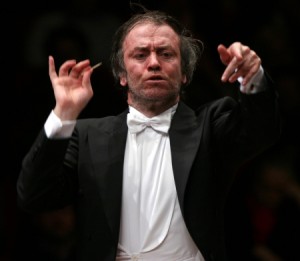Last Sunday afternoon’s Vienna Philharmonic concert at Carnegie Hall began with a Valery Gergiev moment. Mounting the podium, he turned to the concertmaster and shrugged his shoulders to acknowledge that (as sometimes happens to Gergiev in particular) he had arrived a little late and kept the musicians waiting. He then took a deep breath and launched an unforgettable reading of the Prelude and Good Friday Spell from Wagner’s Parsifal.
The second half of the concert, with Tchaikovsky’s Manfred Symphony, was incendiary – a rare musical phenomenon that bears some scrutiny and analysis.
Wilhelm Furtwangler was famous or notorious for his indistinct baton gestures. He did not wish to over-instruct his players. He invited an initiative that was partly theirs.
With his ever fluttering hands and arms, Gergiev insists that his performances, no matter how much or little rehearsed, not be over-prepared. The pay-off is an intense synergy unknown among conductors who impose submission to pre-calibrated rubatos, sharply drawing attention to themselves. A Furtwangler or Gergiev, by comparison, can unleash a primal musical force that is wholly impersonal. They can ignite a Dionysian intensity that can only be leaderless, can only be communal.
Vienna’s magnificent orchestra is different from Gergiev’s magnificent Mariinsky Orchestra. Its sounds are sweeter. Its synergy with Gergiev is dynamic. The fullness and depth of sonority, the regal low strings informing Sunday’s performances were Gergiev signatures. But there was more daylight than in the St. Petersburg sound. (I am not choosing, just comparing.)
The resulting performance of the Parsifal music doubtless displeased the precision-police. But Gergiev’s reading wasn’t about precision. It feasted on color and texture. It also majestically sustained a musical line stretching to infinity.
The Manfred Symphony, after intermission, isn’t much heard for a reason. A 50-minute essay in Faustian striving and redemption, it sags in places. I read in Jack Sullivan’s Carnegie program note that Leonard Bernstein called it “trash.” Certainly Tchaikovsky’s Manfred, estranged from humankind, at home with dark despair, requires inspired advocacy. As with Shostakovich’s kindred confessional symphonies, Manfred turns banal absent maximum emotional and physical commitment. As with so much of Liszt, it needs to be “made” – molded, interpreted.
The Gergiev/Vienna Manfred Symphony was a performance for the ages. The first movement coda – an avalanche of grief – was titanic. Even more remarkably, the symphony’s apotheosis told. I still cannot believe that this problematic note of triumph — laced with harp arpeggios, punctuated by stentorian organ chords — is an emotional state Tchaikovsky earned. But I will never hear a Manfred performance more momentarily persuasive.
The first encore was the act two “Panorama” from The Sleeping Beauty – so airborne, so trembling with beauty that only levitating ballerinas could have danced to it. In fact, a complete Sleeping Beauty delivered by this orchestra and conductor, in this hall, would surely surpass any possible performance by the American Ballet Theatre or New York City Ballet. Those companies do not nearly possess the musical or acoustic resources to do justice to Tchaikovsky (or Prokofiev). This is a topic
I have belabored before.
The second and final encore was the “Thunder and Lightning” Polka by Johann Strauss, Jr. Here Gergiev let the orchestra play by itself (with plenty of thunder). The unlikely sequence of Wagner-Tchaikovsky-Tchaikovsky-Strauss proved magically cathartic.
Musicians I know complain they cannot follow Gergiev’s beat. I know orchestra managers who consider him unreliable and under-prepared. I cannot imagine what priorities they pursue.


Joe :
Had the pleasure of working with Gergiev during my days with the Minnesota Orchestra. His ” time management” may leave a lot to be desired but the concerts were magnificent and that is what is remembered.
Could be that Mr. Horowitz has priorities that are far less demanding than the listeners who
are not as taken up with Gergiev as Mr. Horowitz seems to be . His explanation of the 2nd. rate Manfred
work tells us a lot about his musical perceptions and expectations .